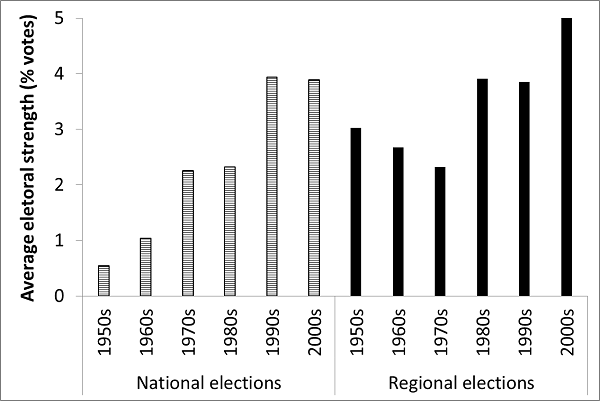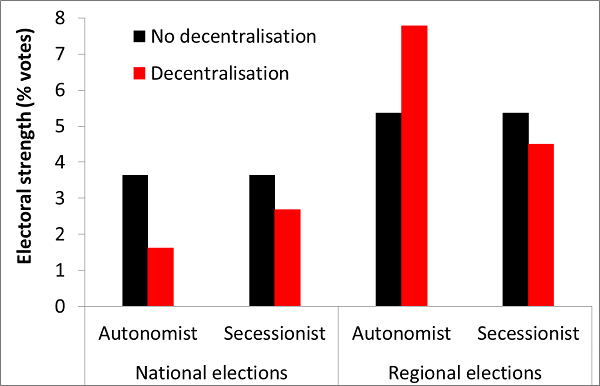
 The effect of decentralisation reforms on the electoral performance of regionalist parties remains unclear. Using data from eleven Western democracies, Emanuele Massetti and Arjan Schakel show that decentralisation reforms influence regionalist parties in different ways across regional and national elections. They write that such reforms undermine regionalist parties in national elections, while strengthening them in regional ones, but also claim that the effects depend upon the level of party radicalisation.
The effect of decentralisation reforms on the electoral performance of regionalist parties remains unclear. Using data from eleven Western democracies, Emanuele Massetti and Arjan Schakel show that decentralisation reforms influence regionalist parties in different ways across regional and national elections. They write that such reforms undermine regionalist parties in national elections, while strengthening them in regional ones, but also claim that the effects depend upon the level of party radicalisation.
Regionalist parties have become influential actors in Western democracies, in spite of their relatively limited electoral weight. The referendum on Scottish independence advocated by the Scottish Nationalist Party (SNP) is now scheduled for September 2014. In Spain, there is ongoing mobilisation for a similar referendum to be held in Catalonia, which is supported by Catalan nationalist parties. These are just two of the most recent examples of how regionalist parties can influence democratic politics and even pose a threat to state integrity.

During the last four decades many states have tried to handle regionalist claims by devolving power to those regions. The 1970s saw the concession of wider self-government powers to South Tyrol in Italy, the start of the federalisation process in Belgium, the creation of autonomous communities in democratising Spain and the first, unsuccessful, attempt to devolve powers to Scotland and Wales in the UK. A new wave of devolution reforms followed in the 1990s and early 2000s – this time with concrete outcomes in the UK – under pressure from old and newly emerged regionalist parties. The aim of these reforms was to appease the demands of the regionalist side and to find a new satisfying equilibrium between their demands and the needs of the whole state. The underlying idea was that decentralisation reforms would neutralise radical regionalist threats by undermining the electoral weight of regionalist parties. The examples of Scotland and Catalonia suggest that this strategy may have failed. But what is the general trend beyond these two specific cases?
Two aspects are often overlooked in the discussion of whether decentralisation reforms actually weaken or strengthen regionalist parties. First, regionalist parties compete against state-wide parties at the regional and national level. Because of their limited geographical scope, regionalist parties are, in most cases, only interested in policy achievements at the national level and office holding at the regional level. In national elections, citizens vote for regionalist parties thinking almost exclusively about self-government issues, whereas in regional elections, they may vote for such parties because of their general proposals for regional government.
As a consequence, devolution reforms might undermine the ‘mission’ of regionalist parties in national elections more than in regional ones. Second, the ideology of regionalist parties is also very important. Secessionist parties attract more radical voters than autonomist parties do. Devolution reforms tend to appease moderate voters more than radical ones, and as a result, secessionist parties could suffer lower electoral losses than autonomist parties.
To assess the effect of decentralisation on the electoral strength of regionalist parties, we built a dataset which contains electoral scores for 77 regionalist parties for national and regional elections across 11 Western democracies in the period 1950-2010. We coded regionalist parties as ‘moderate/autonomist’ if their declared aim is to obtain or enhance regional self-government within the framework of the existing states. We coded parties as ‘radical/secessionist’ if their declared aim is secession from the state, whether to create a new independent state or to join another existing state. Chart 1 below shows the average electoral performance of regionalist parties in their respective regions for the 11 states studied.
Chart 1: Average electoral performance of regionalist parties in 11 western democracies from 1950-2010 (percentage vote share)

Note: The countries covered in the study were Belgium, Canada, Denmark, France, Germany, Italy, Netherlands, Spain, Sweden, Switzerland, and the UK. For full calculations see the authors’ longer paper.
From this chart it emerges that regionalist parties have had a steady growth in national elections until the 1990s and a slight decrease in the 2000s. Regional election scores show more fluctuation, although they remain above the national elections’ averages in the time period studied. In both regional and national elections, regionalist parties’ results are higher in the 2000s than in the 1970s, indicating that devolution reforms have not achieved the intended weakening effect.
In order to evaluate the impact of devolution reforms on the two types of regionalist parties and across the two levels of government, we used data on devolution reforms to develop a model that shows the variation of electoral strength. The most important results of this analysis are presented in Chart 2 below.
Chart 2: Impact of devolution reforms on electoral performance of regionalist parties in 11 western democracies from 1950-2010 (percentage vote share)

Note: For full calculations see the authors’ longer paper.
The figures in Chart 2 indicate that in national elections both autonomist and secessionist regionalist parties suffer electoral losses after a decentralisation reform has been carried out. The accommodation strategy seems to weaken the electoral support of regionalist parties. However, the electoral damage is significantly bigger for autonomist parties than for secessionist ones. This means that decentralisation reforms provide an incentive for regionalist parties to radicalise in order to prevent electoral losses.
In contrast, in regional elections, decentralisation reforms translate into a strong electoral advantage for autonomist parties, while secessionist ones are unaffected. It is worth noting that regionalist parties often present themselves as credible and responsible parties of local government and hold moderate positions on the traditional left-right dimension. This type of strategic positioning is attractive to the majority of regional voters and can explain why they benefit most from the empowerment of regional institutions.
These findings show that the electoral effects of decentralisation reforms are complex and work in opposite directions across the two levels of government. Reforms undermine regionalist parties in national elections, but strengthen them in regional ones. In addition, they also seem to place contradicting incentives for the party across the two levels. Radicalisation can minimise electoral losses on the national level, but moderation can maximise electoral gains at the regional level. Crucially, the question remains as to which of these two incentives will prevail.
Please read our comments policy before commenting.
Note: This article gives the views of the authors, and not the position of EUROPP – European Politics and Policy, nor of the London School of Economics.
Shortened URL for this post: http://bit.ly/1hZpxF1
_________________________________
 Emanuele Massetti – Gediz University Izmir
Emanuele Massetti – Gediz University Izmir
Emanuele Massetti is Assistant Professor in Political Science at Gediz University’s Department of Political Science and Public Administration. He studies political parties and elections in a comparative perspective, focusing on ethno-territorial politics, institutional reforms, and immigration.
 Arjan H. Schakel – Maastricht University
Arjan H. Schakel – Maastricht University
Arjan H. Schakel is Assistant Professor in Research Methods at Maastricht University. His research interests include federalism, regional government, regional elections, multilevel governance, and regionalist parties.


